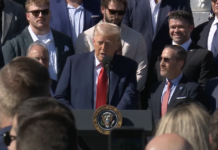
WASHINGTON (GA Recorder) — The Biden administration reminded doctors and other health care providers Monday that a federal law protects them if they provide abortion services to save a patient’s life or health in emergency situations — regardless of what state laws say.
U.S. Health and Human Services Secretary Xavier Becerra wrote in a letter that the Emergency Medical Treatment and Active Labor Act protects health care providers who determine their patient needs a stabilizing treatment to address a range of diagnoses.
Those could include ectopic pregnancy, pregnancy loss complications, or preeclampsia with severe features.
“Under the law, no matter where you live, women have the right to emergency care — including abortion care,” Becerra said in a written statement.
“Today, in no uncertain terms, we are reinforcing that we expect providers to continue offering these services, and that federal law preempts state abortion bans when needed for emergency care,” he continued. “Protecting both patients and providers is a top priority, particularly in this moment.”
The letter notes that EMTALA violations, which would follow a complaint and an investigation, could result in the hospital losing its Medicare provider agreement. It could also face civil fines, he wrote.
Executive order
The HHS announcement comes just three days after President Joe Biden signed an executive order that sought to ensure medication abortion, which is Food and Drug Administration approved through 10 weeks into a pregnancy, and out-of-state travel to access abortion remains legal throughout the country.
Biden on Friday also “asked the Chair of the Federal Trade Commission to consider taking steps to protect consumers’ privacy” when people use the internet to search for information about abortion services.
The White House has been criticized by some abortion rights organizations for not going further and declaring a public health emergency to address access to abortion following the Supreme Court ruling that ended the nearly five-decade-old constitutional right to an abortion.
Jen Klein, director of the White House Gender Policy Council, said Friday that while a public health emergency isn’t off the table, it might not provide widespread assistance to patients seeking abortion care in states that have banned or heavily restricted the procedure.
Declaring a public health emergency, she said, would only provide access to money within the public health emergency funds, which has “very little money, tens of thousands of dollars” and “doesn’t release a significant amount of legal authority.”







